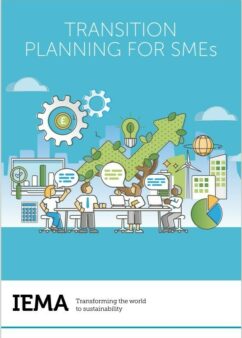Understanding the Challenges of Starting Net Zero Transitions in SMEs
Dr. Roshan Boojihawon and Dr. Carole Couper from the University of Birmingham discuss the need for an action plan to support the transition of UK SMEs and how IEMA's latest guidance will help SMEs know how to start their Net Zero journey.Rishi Sunak has certainly stirred the waters to a Net Zero storm this week, insisting on a more “pragmatic and realistic” approach to net zero whilst watering down some of the UK’s immediate Net Zero ambitions. The truth, in our view, is that whilst there has always been a pressing need to act on climate change through net zero targets, there was no clear nationally coordinated and realistic action plan to support the transition of UK SMEs when those firms make up to 99.9 % of all UK firms.
Undoubtedly, Sunak’s announcement has created some confusion and uncertainty for businesses, but the message is also that net zero is not going anywhere; it is here to stay! This seems just a reshuffle of the deck to reaffirm Net Zero priorities and pathways in cost-effective and attainable ways. SMEs, most certainly, can benefit from clarity around cost and transition pathways. According to University of Birmingham (UoB) research, SMEs are particularly vulnerable to net zero transitions and face a complex combination of risks and challenges they cannot address independently. Net zero targets and policies have focused on big firms, overlooking SMEs, who account for a large share of Scope 3 emissions and consumption throughout markets and supply chains. Net zero without SMEs’ engagement is not possible.
Our current research reveals that the lack of uptake in Net Zero accounting amongst SMEs is rarely due to the unwillingness of managers to incorporate relevant measures into their working businesses. Instead, the considerable uncertainty around Net Zero reporting and simply not knowing where to begin generates cognitive (combining ideas, behaviour, and emotions) and practical hurdles (related to costs, resources, expert knowledge, time, and speed) to acting on Net Zero targets. At the same time, there is a huge opportunity for SMEs to show adaptive leadership within their sectors and benefit from first-mover advantages and better relationships with their business partners, but only if they are proactive and start investing now in Net Zero transition plans. SMEs have no choice but to engage with Net Zero. It is the future of business globally, particularly when they are connected with larger players within global supply chains. Taking a myopic view on reducing carbon emissions is pointless; we need a collaborative and collective strategy towards Net Zero.

IEMA’s recently published Transition Planning for SMEs report provides a great push and support to SMEs who want to start their Net Zero journey. The University of Birmingham is also leading research into how SMEs can accelerate Net Zero transitions using innovative tools and strategies to integrate Net Zero into business operations. With the right approach, the sustainable SME can simultaneously reduce its carbon footprint and save money.
Check out the next workshop the University of Birmingham organised on November 23, 2023:
Decarbonising SMEs in the UK: Engaging to address Scope 3 emissions: Exploring Tools, Standards and Strategies – Register here.
Authors:

Dr. Roshan Boojihawon, Associate Professor in Strategy - University of Birmingham

Dr. Carole Couper, Associate Professor in Strategy and International Business - University of Birmingham
Please note: the views expressed in this blog are those of the individual contributing member and are not necessarily representative of the views of IEMA or any professional institutions with which IEMA is associated.
Subscribe
Subscribe to IEMA's newsletters to receive timely articles, expert opinions, event announcements, and much more, directly in your inbox.
